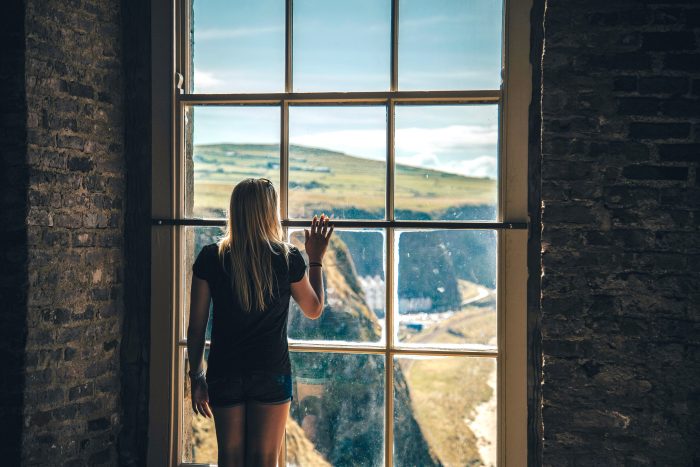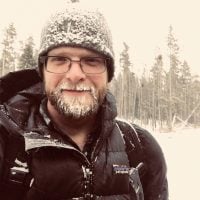Did we cry out when the first road was paved?
Did we stand in anxious uncertainty as we looked upon the thick, feelingless blanket of detachment?
When the space between our buildings and houses became unnatural—did we cry out?
Did we feel the dread of escalating disconnection when first we slept inside structures, which were undoubtedly meant to shelter us, but instead closed us off from the lullabies of the earth?
Did we sleep fitfully when we could no longer hear the river, or the wolves, or the crickets?
When the snow no longer quieted our evenings, for they were silent already within our protective bunkers, throwing numbness over our senses—did we feel the pain in our hearts?
When we could no longer experience the sky above our heads nor the wind through our hair, did we raise the alarm?
Did we give voice to that quiet, incorruptible part of us? The part that said, “No, no, this is not right. We are not meant to be protected. We are not meant to be held captive in prisons of our own making.”
When first we traveled with unnatural power, propelled forward through time and space by the harnessed combustion of our innovation and relentless pursuit of leisure, did we wonder if we were straying? Or, rather, did we see how far we’d already strayed from the lives into which we should have been born?
Progress has always been our bisyllabic manifesto, but its means have scarcely been questioned, and much more infrequently, its ends.
Does progress ever end? Can we ever achieve it? Or is it unattainable; the great siren of our own generations and those that came innumerable years before us?
Stories have warned us for eons against the clever allure of things that seem to hold promise of satisfaction, but in the end only offer destruction. Have we learned? Or do we dismiss these cautionary tales the same way we dismiss the horrors of our world, never imagining that they could hold gravity in our own lives.
“Those are the sorts of things other people have to worry about, but not me,” we say in self-condolence.
Yet, here we are, the victims of our own treason against ancient ways, the tireless hunters of convenience and ease.
When I escape into the wilderness, I am struck by the simplicity of communion with the wild. There lies within us, an earnest depth, which knows the wind as friend and the sky as home. This primal blood coursing through our veins knows no foe on four legs, six, or two.
It fears not the inevitability of death. This blood boils not when faced with an adversary, whether worthy or laughable. It remains rooted in the honest truth that we all exist within the soul of the world, and to it we will all return.
When we are wild: we are fearless.
But pour this fierce blood into glass bottles and secure it pitifully inside the rib cage of domesticated man, and you will find it frightens easily, ever worried for its own fate and safety.
When did we decide this place was not good enough, not comfortable enough?
And to whom do we owe our satirical gratitude? What sly trickster lured us out of Eden and into the bustle of city streets, choked with pollution, and fraught with more threats to mental wellness than physical?
Was our fall from grace a willing descent, or did we tumble, tripping on the shackles by which are now bound?
And have we found the cheerful celebration of our capitalistic captor to be our only worthwhile salvation from this dirty, demeaning existence?
Perhaps we buy to avoid the reality of living these lies.
Slaves to our purported safety, captives of our own convenience. Has the tyranny of technology pulled the wool so far over our eyes that we are both unable and unwilling to search for God in the fragrant rabbit brush of a mountain vista at sundown, in the late months of summer?
I want to go back.
I want the struggle, and the hustle, and the grit of life lived amongst the coyotes and snakes. Convenience comes at too high a price for me to condone. I’d like to unsubscribe. I’d like to opt out.
“Go ahead,” some say, “and live off the land. People still do it, you know?”
And perhaps they do.
Perhaps there are still a few wild souls among us, dancing naked under the moon, reaping their bounty from a consenting earth. But the truth of the honest naturalism I desire, longs for mountains to roam without fences, and animals to follow without ear tags or tracking collars.
I ache for the instinct required to live a life without science.
I crave the vulnerability of angry weather atop a nomadic people. Be gone, complications of economies and mechanized existence.
Give me water from the stream; meat from the game; nectar from the flower; and sun from the heavens.
Give me rain that quenches the valley and snow that demands we stay close to the fire.
Give me the ache of hunger that drives us to seek food, and the submission to God’s will, requisite of a hard and holy life.
“We have strayed too far,” I say.
I am met with vacant stares and few embers in the eyes of kindred souls. “Let’s do this differently,” I plead. Very few understand.
Which leads me to wondering—did we even cry out when the first road was paved?
~


 Share on bsky
Share on bsky





Read 8 comments and reply